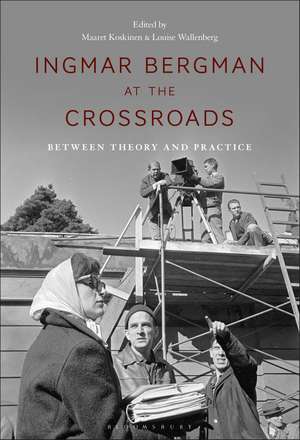Ingmar Bergman at the Crossroads: Between Theory and Practice
Editat de Maaret Koskinen, Louise Wallenbergen Limba Engleză Hardback – 14 dec 2022
Preț: 540.15 lei
Preț vechi: 773.90 lei
-30% Nou
Puncte Express: 810
Preț estimativ în valută:
103.36€ • 112.62$ • 87.09£
103.36€ • 112.62$ • 87.09£
Carte tipărită la comandă
Livrare economică 23 aprilie-07 mai
Preluare comenzi: 021 569.72.76
Specificații
ISBN-13: 9781501389641
ISBN-10: 1501389645
Pagini: 272
Ilustrații: 21 bw illus
Dimensiuni: 152 x 229 mm
Greutate: 0.53 kg
Editura: Bloomsbury Publishing
Colecția Bloomsbury Academic
Locul publicării:New York, United States
ISBN-10: 1501389645
Pagini: 272
Ilustrații: 21 bw illus
Dimensiuni: 152 x 229 mm
Greutate: 0.53 kg
Editura: Bloomsbury Publishing
Colecția Bloomsbury Academic
Locul publicării:New York, United States
Caracteristici
Foreword by Ang Lee, director of films such as Sense and Sensibility (1995), Crouching Tiger, Hidden Dragon (2000), Hulk (2003), Brokeback Mountain (2005), Life of Pi (2012), and Gemini Man (2019), among others
Notă biografică
Maaret Koskinen is Professor Emeritus in Film Studies at Stockholm University, Sweden. Louise Wallenberg is Professor in Fashion Studies at Stockholm University, Sweden.
Cuprins
Acknowledgements Preface Ang Lee (Filmmaker) Introduction Maaret Koskinen (Stockholm University, Sweden) and Louise Wallenberg (Stockholm University, Sweden)1. Hour of the Wolf: Nightmares and CreativityMargarethe von Trotta (Film Director, Germany)2. Working with Bergman: Interview with Film and Television Producers Katinka Faragò and Måns ReuterswärdMaaret Koskinen (Stockholm University, Sweden)and Louise Wallenberg (Stockholm University, Sweden)3. Ambiguity and the Making of Nattvardsgästerna/Winter LightPaisley Livingston (Lingnan University, Hong Kong and Uppsala University, Sweden)4. The Passion of Anna: The Wondrous Alchemy Between Actors and Landscape, Interview with Atom EgoyanMaaret Koskinen (Stockholm University, Sweden) and Louise Wallenberg (Stockholm University, Sweden)5. Scenes from On and Off the Set: Ingmar Bergman, Power and MetooMaaret Koskinen (Stockholm University, Sweden)6. For Good or For Bad? Bergman's Ambivalent Influence - Some ObservationsLinus Tunström (Independent Scholar, Sweden)7. Jacobi's Burden: "Jewish" Figurations in Fanny och AlexanderJonathan Rozenkrantz (Lund University, Sweden)8. Producing The Magic Flute (1975): Conversation with Måns Reuterswärd and Katinka FaragóMaaret Koskinen (Stockholm University, Sweden) and Louise Wallenberg (Stockholm University, Sweden)9. Metareference, Metalepsis, and Music in Liv Ullmann's and Ingmar Bergman's FaithlessAlexis Luko (Carleton University, Canada)10. Bergman's The Magician: The Art of Creating IllusionsAllan Havis (University of California, San Diego, USA)11. Author, Auteur, Actor: 21 Fragments on Bergman, Ullmann, and PersonaJames Schamus (Columbia University, USA)12. Dear Director: Adapting Bergman's Failures and Leftovers Into a Play, and a Fan-letter Into a FilmMarcus Lindeen (Writer/ Director, Sweden)13. Making (the) Silence Speak: Remake, Retake, RectifyLouise Wallenberg (Stockholm University, Sweden) Conclusion Maaret Koskinen (Stockholm University, Sweden)and Louise Wallenberg (Stockholm University, Sweden) BibliographyFilmographyContributor biosIndex
Recenzii
An essential new anthology that will pay dividends in Theatre, Film, and Bergman Studies for years, perhaps decades to come. The collected essays and interviews are smart, engaging, and focused on concerns of vital interest to the contemporary reader. Nobody interested in the Demon Director can afford to pass it up.
This new anthology by renowned Bergman scholars Maaret Koskinen and Louise Wallenberg presents a cloud of witnesses, giving testimony on diverse aspects of the art of the multifarious Swedish film director and writer. Beyond the obvious heterogeneity of the different perspectives lies a recurrent common interest in the practical and also collective work, the "art of making illusions" and thus, the art of "making the silence speak".
Painting a truly mature, challenging picture of Bergman's overdetermined authorship, both celebrating its results on screen while also interrogating the ethical costs of such uncommon power spanning multiple decades, Maaret Koskinen and Louise Wallenberg's expertly curated volume rises above the current Manichean vogue for designating authors as simple heroes or villains. With its genuinely refreshing emphasis on Swedish production context and a highly generative mix of academic analyses, interviews with collaborators, and commentaries by well-chosen film and theatre directors of subsequent generations, this very welcome book features an entirely apposite mix of admiration, new insight, and more troubled reflection.
This new anthology by renowned Bergman scholars Maaret Koskinen and Louise Wallenberg presents a cloud of witnesses, giving testimony on diverse aspects of the art of the multifarious Swedish film director and writer. Beyond the obvious heterogeneity of the different perspectives lies a recurrent common interest in the practical and also collective work, the "art of making illusions" and thus, the art of "making the silence speak".
Painting a truly mature, challenging picture of Bergman's overdetermined authorship, both celebrating its results on screen while also interrogating the ethical costs of such uncommon power spanning multiple decades, Maaret Koskinen and Louise Wallenberg's expertly curated volume rises above the current Manichean vogue for designating authors as simple heroes or villains. With its genuinely refreshing emphasis on Swedish production context and a highly generative mix of academic analyses, interviews with collaborators, and commentaries by well-chosen film and theatre directors of subsequent generations, this very welcome book features an entirely apposite mix of admiration, new insight, and more troubled reflection.
